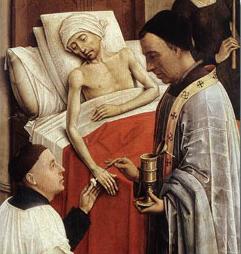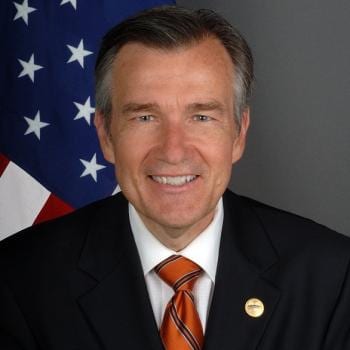This issue comes up periodically, and it’s been raised again in the blog Pray Tell:
The question of whether a permanent deacon may anoint the sick has come up in our time because of pastoral need. This has been argued against on the basis that the anointing of the sick also forgives sins and a deacon does not have that power. This argument does not dispose of the question, however. Deacons are permitted to baptize (and even a lay person may baptize in case of an emergency), and baptism forgives all sin. Is it theologically possible to distinguish between the sins of the unbaptized, which can be forgiven by a deacon who baptizes, and the sins of a baptized person, which may not be forgiven via the anointing of the sick? It’s also interesting to note that the practice of private confession and reconciliation as we know it today originated with Irish monks (lay people) and was only later restricted to priests. The question of how forgiveness is mediated – even in the Sacrament of Reconciliation — has been answered variously in Christian history, prompted by pastoral circumstances and needs.
We already send out ministers to bring the Eucharist, the premier sacrament to which all other sacraments are ordered. Could the bishop not also properly train and depute special ministers to anoint the sick, and similarly send them out to places where the need is great? To increase the number of people who may anoint the sick is not the same as creating a free-for-all in which anyone with a warm heart can take a bottle of Bertoli’s and do what they will. A preparation process and an adapted rite would have to be devised, the limits of which would need to be carefully delineated. But the point is, we have the ingenuity to do it. We have the faith to do it. If we can come up with an order of service for a Sunday celebration in the absence of a priest, we can certainly do this.
Here’s a good explanation for why deacons do not confer this sacrament:
That only priests (including bishops) can confer the sacrament of Anointing is the clear teaching of the Catholic Church.
“Only priests (bishops and presbyters) are ministers of the Anointing of the Sick.” (CCC 1516)
“Every priest, but only a priest, can validly administer the anointing of the sick.” (Code of Canon Law 1003.1)
“All priests, and only priests, validly administer the anointing of the sick.” (Eastern Code of Canon Law 739.1)
“Further, it is also indicated there [James 5:14] that the proper ministers of this sacrament are the presbyters of the Church, under which name in that place are to be understood not the elders by age or the foremost in rank among the people, but either bishops or priests duly ordained by them with the imposition of the hands of the priesthood [1 Timothy 4:14].” (Trent, Session XIV)
That priests and only priests can confer this sacrament is clearly taught in Sacred Scripture:Is any man sick among you? Let him bring in the priests of the church, and let them pray over him, anointing him with oil in the name of the Lord. (James 5:14)
This is not the type of teaching which can change. The minister of the sacrament of Anointing of the Sick has been and will always be priests and only priests (including, of course, bishops). Still, we ask, Why is it so?
Anointing of the Sick forgives sin, even mortal sin
Anointing of the Sick is principally directed to spiritual healing. But what is the spiritual healing which this sacrament effects? St. James tells us that it forgives sin, and the Council of Trent teaches dogmatically that both mortal and venial sins are forgiven through this sacrament. However, the forgiveness of sin per se is not the principal effect of this sacrament, but is more of a side-effect. This is why St. James does not say simply, “Anoint the sick person and his sins will be forgiven”, but, if he be in sins, they shall be forgiven him. (5:15)
…While it is true that deacons can baptize, we do not say that they can forgive sins. Indeed, the sacrament of baptism does forgive all sin (both original and actual sin), but it is not so much through the power of the minister as through the sanctifying power of regeneration through water and the Holy Spirit. Thus, we do not say that a priest or deacon or lay person “forgave that baby’s sins” when he baptized him – Baptism is not given through the “power of the keys”.
Hence, since Anointing is the completion of the sacrament of Penance (especially as to the effect of the two sacraments), and because Anointing is directed principally to spiritual healing through the remission of the remnants of sin, only those who have the power to absolve from sin through the sacrament of Reconciliation are able to confer Anointing of the Sick.
Since the “power of the keys” was entrusted only to the priests (and bishops), only these can confer Penance and Anointing. Because neither deacons nor the laity can hear confessions, neither can they confer Anointing of the Sick.
In 2005, this question was brought before the Vatican. Then-Cardinal Ratzinger offered this:
The Code of Canon Law, in can. 1003 1 (cf. also can. 739 1 of the Code of Canons of the Eastern Churches) exactly reflects the doctrine expressed by the Council of Trent (Session XIV, can. 4: DS 1719; cf. also the Catechism of the Catholic Church, n. 1516), which states that “only priests (Bishops and presbyters) are ministers of the Anointing of the Sick”.
This doctrine is definitive tenenda. Neither deacons nor lay persons may exercise the said ministry, and any action in this regard constitutes a simulation of the Sacrament.
He added as commentary:
The doctrine which holds that the minister of the Sacrament of the Anointing of the Sick “est omnis et solus sacerdos” enjoys such a degree of theological certainty that it must be described as a doctrine “definitive tenenda”. The Sacrament is not valid if a deacon or a layman attempts to administer it. Such an action would be a crime of simulation in the administration of a sacrament, to be penalized in accordance with can. 1379, CIC (cf. can. 1443, CCEO).
To conclude, it would indeed be appropriate to recall that through the sacrament he has received the priest makes present in a quite special way the Lord Jesus Christ, Head of the Church.
In the administration of the sacraments, he acts in persona Christi Capitis and in persona Ecclesiae. The person who acts in this Sacrament is Jesus Christ; the priest is the living and visible instrument. He represents and makes Christ present in a special way, which is why the Sacrament has special dignity and efficacy in comparison with a sacramental: therefore, as the inspired Word says concerning the Anointing of the Sick, “the Lord will raise him up” (Jas 5: 15).
The priest also acts in persona Ecclesiae. The “presbyters of the Church” (Jas 5: 14) pray on behalf of the whole Church; as St Thomas Aquinas says on this subject: “oratio illa non fit a sacerdote in persona sua…, sed fit in persona totius Ecclesiae” (Summa Theologiae,Supplementum, q. 31, a1, ad 1). Such a prayer is heard.
Bottom line: don’t expect this to change anytime soon.












